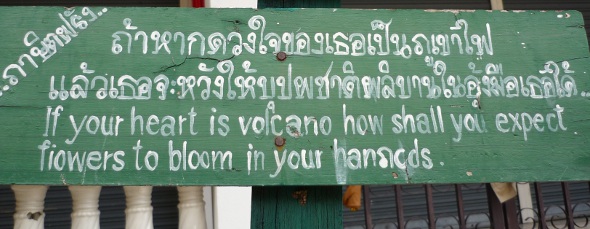Hearts and Minds
TIME : 2016/2/24 18:40:48
The Thai word for heart is ‘hua-jai’. The word ‘jai’ in isolation is also used for heart although in this context the nearest English equivalent is probably ‘mind’. The word ‘jai’ is frequently used in combination with other words to denote emotional states. Thai people often talk about having a good heart, a black heart, a cold heart and numerous other combinations depending on how they are feeling or the message they want to convey. Listed below are a number of the more common expressions of feelings that you may hear if you listen carefully enough. You will notice that sometimes the word jai comes before a word and sometimes after a word.
1) Jai dii
The word ‘dii’ means good so if somebody tells you that you are ‘jai dii’ it’s a big compliment; being kind or good-hearted is a trait that is particularly admired in Thailand.
2) Jai dam
The word dam means black so a person who is ‘jai dam’ lacks feelings or pity.
3) Dii jai
Used in this combination ‘dii jai’ means happy. There is another phrase for happiness, ‘mii kwaam-suk’, but ‘dii jai’ is commonly used when people say that they are happy.
4) Jai yen
‘Yen’ in this instance means cool so to have a cool heart means you are calm or easy-going. Thai people will tell you that being ‘jai yen’ is a good thing, not least because it fits in with Buddhist philosophy and helps to avoid confrontation. However, don’t believe any guide book that tells you that every Thai person is jai yen!

5) Jai rawn
‘Rawn’ means hot and just as the weather can be hot so can your heart. The nearest equivalent in English is being a hot-head and you should always remember that in Thailand being jai yen is an admirable quality in any person. A Thai proverb (see picture above) says, ‘If your heart is volcano how shall you expect flowers to bloom in your hand.’
6) Tok jai
This is an expression used to denote surprise or shock, so if somebody decides to play a practical joke on you and jumps out from behind a cupboard, you can say ‘tok jai’. The word ‘tok’ means to fall or drop so your heart literally drops in shock.
7) Sabai jai
If you’re on a beach, swinging in a hammock with a cold beer in your hand and the sound of the waves lapping the shore then you are likely to be ‘sabai jai’ which means that you are contented or at ease .
8) Waan jai
Waan translates as sweet so before you call somebody ‘waan jai’ (sweetheart) make sure they feel the same way about you! If you do call somebody ‘waan jai’ you may get a laugh and a response of ‘bpaak waan’ (sweet mouth).
9) Kreng jai
The whole subject of kreng jai is quite complicated but it’s about respect, consideration and social hierarchy all of which are very important in Thai society.
10) Sao jai
When you leave Thailand at the end of your stay you may well be ‘sao jai’ (sad). Thai friends may be ‘sia jai’ (sorry) to see you go as well as also being ‘sao jai’.
Take a look at my recommendations for phrase books and learning some basic Thai >>
photo © Thaizer
